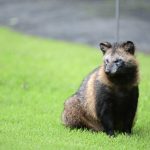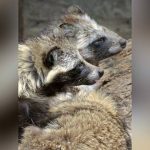After international scientists discovered a potential link between the origin of the covid-19 virus and raccoon dogs, medical experts in Western Pennsylvania said the animal could be where the virus began.
Samples collected from the Huanan seafood market in Wuhan, China — where the first human cases of covid-19 were found in late 2019 — contained genetic material from raccoon dogs, indicating the fox-like animals may have been infected with the virus.
Raccoon dogs were linked to the first SARS outbreak in 2003, said Dr. Amesh Adalja, a Pittsburgh-based infectious disease expert and senior scholar at the Johns Hopkins Center for Health Security.
“That put it on a list of animals that were susceptible to covid-related viruses,” he said, adding that they were known to have been sold at the Huanan seafood market, which is linked to the start of the pandemic.
Experts have considered raccoon dogs to be a potential link to the virus’s origins since the start of the pandemic, Adalja said. The new research that shows the animal’s DNA mixed with samples of the virus is another “association” between raccoon dogs and the virus, he said, but the research has not been published or peer-reviewed, so it’s too soon to say how reliable it is.
“That’s not definitive proof,” Adalja said.
Vaughn Cooper, a professor of microbiology and molecular genetics and director for the Center for Evolutionary Biology and Medicine at the UPMC School of Medicine, said he’s fairly convinced of the theory that the virus originated in an animal like the raccoon dog and spread to people.
The new evidence that shows the DNA of the raccoon dogs mixed with the RNA of the covid-19 virus is “quite strong,” he said.
There’s other scientific evidence that also points to animal origin, Cooper said, as environmental samples were positive for covid-19 “very early in the pandemic” in the area of the market where the raccoon dog samples were collected.
“The number of earliest documented human cases in Wuhan, those cases were disproportionately associated with that market,” he said, adding that there’s also evidence the virus circulated within animal populations there long enough for some small variations to emerge.
Adalja, however, said he doesn’t feel there’s enough evidence yet to discredit other theories about the virus’s origins, like the notion it leaked from a nearby research lab.
“Wuhan is probably the world’s foremost center in the study of coronaviruses,” he explained. “So, for many people, that type of coincidence was too large — that the city in which the most extensive coronavirus is kept, an outbreak occurs there and then you have the Chinese secrecy and lack of transparency.”
The Chinese government, he said, has claimed the virus didn’t originate within its borders. Adalja said the raccoon dog link and the lab leak theory are both “viable hypotheses,” but there’s not enough evidence for him to draw definitive conclusions, in part because the Chinese government hasn’t been transparent about potential evidence.
“When it comes down to origins, I don’t know we ever get to a definitive answer without the transparency from the Chinese government,” he said.
Adalja said U.S. intelligence agencies also haven’t been forthcoming in sharing what they know, making it harder to nail down the virus’s history.
Cooper, however, said he’s not giving up on solving the mystery of covid-19 origins. He believes scientific evidence is “overwhelmingly in favor” of the concept that the virus started in animals and spilled over to the human population,.
Adalja and Cooper both said it’s important that experts try to determine how the virus originated to learn from it.
“This isn’t the only infectious disease emergency we’re going to face. We’re going to have to deal with other coronavirus outbreaks in the future,” Adalja said.
Understanding the origins of the covid-19 pandemic, he said, could help people understand how to avoid making the same mistakes again. For example, if the virus was transmitted from a specific animal, people would know to change their interactions with that animal. If it was caused by a laboratory accident, researchers could work to ensure such a mishap isn’t repeated.
“We do scientifically want to know what animals are more likely to serve as vectors of viruses that are threatening to us humans,” Cooper said.
It’s also worth studying simply because the pandemic had such a wide-ranging impact on society, he said.
“Those who have suffered from it deserve answers,” Cooper said.











